Economics Assignment: Qantas, Virgin Australia, and Market Dynamics
VerifiedAdded on 2021/05/30
|6
|1468
|50
Report
AI Summary
This economics assignment analyzes the competitive dynamics within the Australian airline industry, with a specific focus on the interplay between Qantas and Virgin Australia. The report explores the duopoly market structure, the implications of government intervention, and the strategies employed by Qantas to maintain market dominance. It examines the impact of Virgin Australia's financial struggles and the government's role in allowing foreign investment to support the airline. The analysis delves into the effects of these policies on consumer surplus and market competition, including the potential for Qantas to gain monopoly power. The assignment uses economic principles to evaluate the challenges and opportunities within the industry, highlighting the importance of maintaining a competitive environment to avoid consumer exploitation. References to relevant academic sources are included to support the analysis.
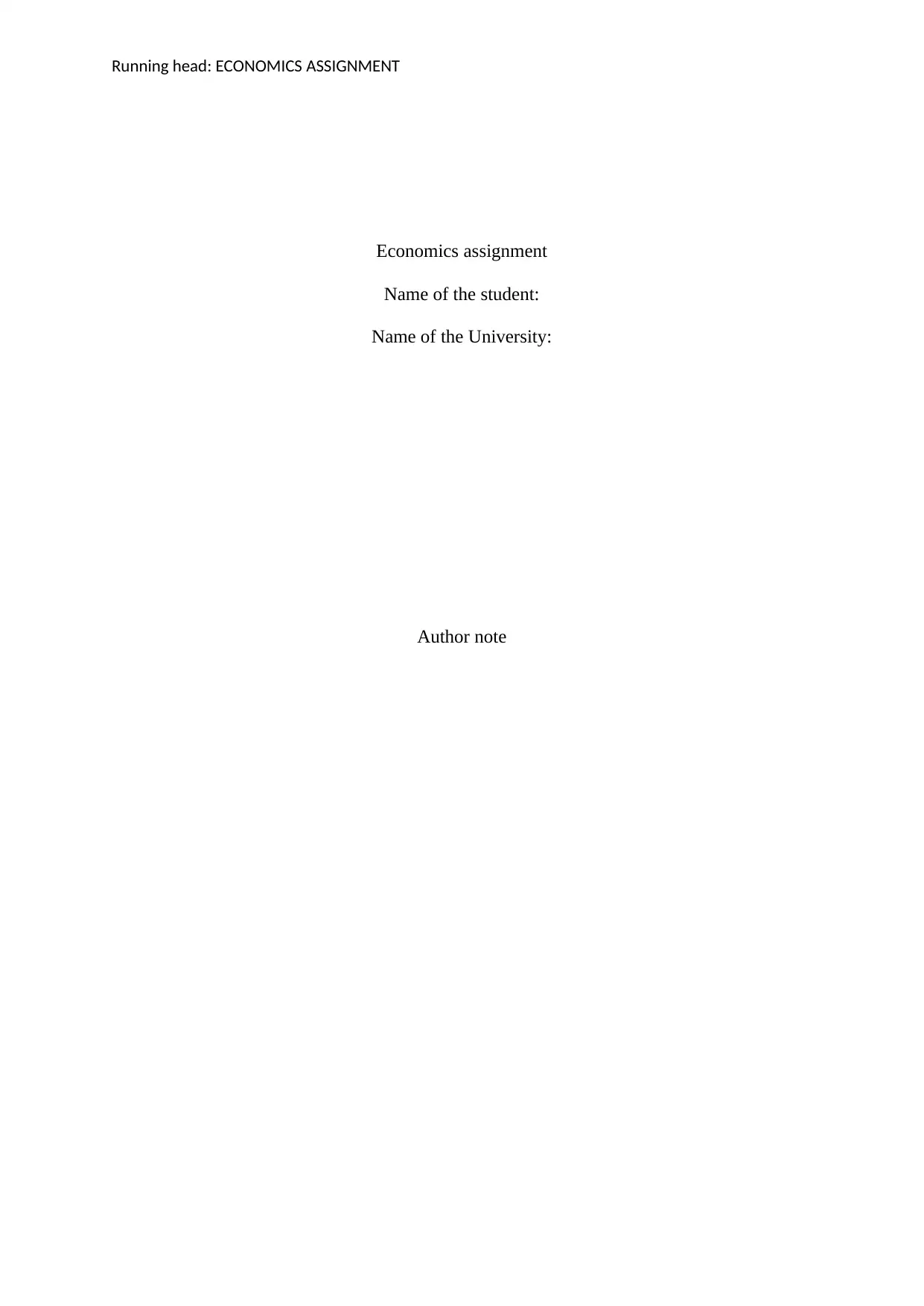
Running head: ECONOMICS ASSIGNMENT
Economics assignment
Name of the student:
Name of the University:
Author note
Economics assignment
Name of the student:
Name of the University:
Author note
Paraphrase This Document
Need a fresh take? Get an instant paraphrase of this document with our AI Paraphraser
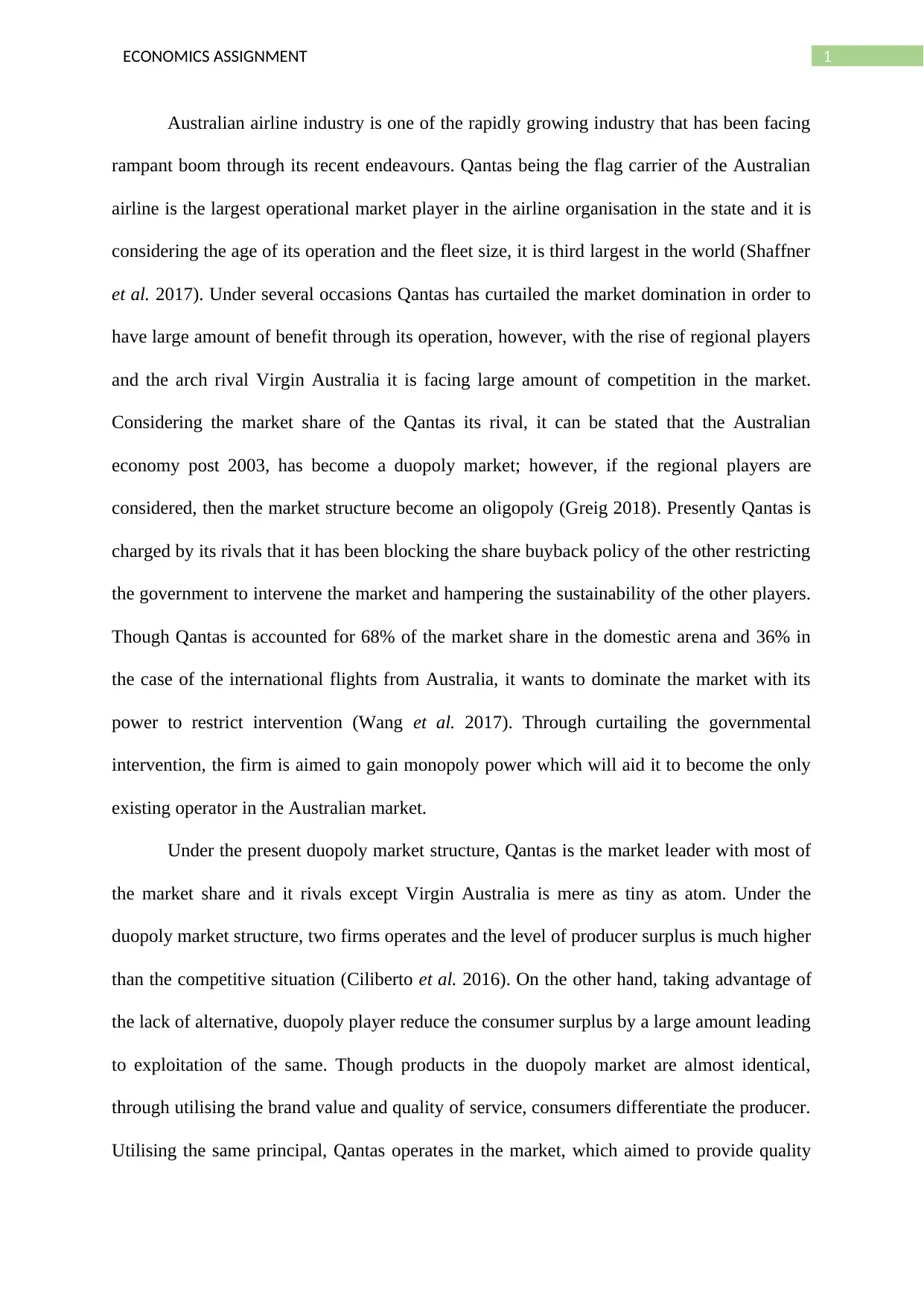
1ECONOMICS ASSIGNMENT
Australian airline industry is one of the rapidly growing industry that has been facing
rampant boom through its recent endeavours. Qantas being the flag carrier of the Australian
airline is the largest operational market player in the airline organisation in the state and it is
considering the age of its operation and the fleet size, it is third largest in the world (Shaffner
et al. 2017). Under several occasions Qantas has curtailed the market domination in order to
have large amount of benefit through its operation, however, with the rise of regional players
and the arch rival Virgin Australia it is facing large amount of competition in the market.
Considering the market share of the Qantas its rival, it can be stated that the Australian
economy post 2003, has become a duopoly market; however, if the regional players are
considered, then the market structure become an oligopoly (Greig 2018). Presently Qantas is
charged by its rivals that it has been blocking the share buyback policy of the other restricting
the government to intervene the market and hampering the sustainability of the other players.
Though Qantas is accounted for 68% of the market share in the domestic arena and 36% in
the case of the international flights from Australia, it wants to dominate the market with its
power to restrict intervention (Wang et al. 2017). Through curtailing the governmental
intervention, the firm is aimed to gain monopoly power which will aid it to become the only
existing operator in the Australian market.
Under the present duopoly market structure, Qantas is the market leader with most of
the market share and it rivals except Virgin Australia is mere as tiny as atom. Under the
duopoly market structure, two firms operates and the level of producer surplus is much higher
than the competitive situation (Ciliberto et al. 2016). On the other hand, taking advantage of
the lack of alternative, duopoly player reduce the consumer surplus by a large amount leading
to exploitation of the same. Though products in the duopoly market are almost identical,
through utilising the brand value and quality of service, consumers differentiate the producer.
Utilising the same principal, Qantas operates in the market, which aimed to provide quality
Australian airline industry is one of the rapidly growing industry that has been facing
rampant boom through its recent endeavours. Qantas being the flag carrier of the Australian
airline is the largest operational market player in the airline organisation in the state and it is
considering the age of its operation and the fleet size, it is third largest in the world (Shaffner
et al. 2017). Under several occasions Qantas has curtailed the market domination in order to
have large amount of benefit through its operation, however, with the rise of regional players
and the arch rival Virgin Australia it is facing large amount of competition in the market.
Considering the market share of the Qantas its rival, it can be stated that the Australian
economy post 2003, has become a duopoly market; however, if the regional players are
considered, then the market structure become an oligopoly (Greig 2018). Presently Qantas is
charged by its rivals that it has been blocking the share buyback policy of the other restricting
the government to intervene the market and hampering the sustainability of the other players.
Though Qantas is accounted for 68% of the market share in the domestic arena and 36% in
the case of the international flights from Australia, it wants to dominate the market with its
power to restrict intervention (Wang et al. 2017). Through curtailing the governmental
intervention, the firm is aimed to gain monopoly power which will aid it to become the only
existing operator in the Australian market.
Under the present duopoly market structure, Qantas is the market leader with most of
the market share and it rivals except Virgin Australia is mere as tiny as atom. Under the
duopoly market structure, two firms operates and the level of producer surplus is much higher
than the competitive situation (Ciliberto et al. 2016). On the other hand, taking advantage of
the lack of alternative, duopoly player reduce the consumer surplus by a large amount leading
to exploitation of the same. Though products in the duopoly market are almost identical,
through utilising the brand value and quality of service, consumers differentiate the producer.
Utilising the same principal, Qantas operates in the market, which aimed to provide quality
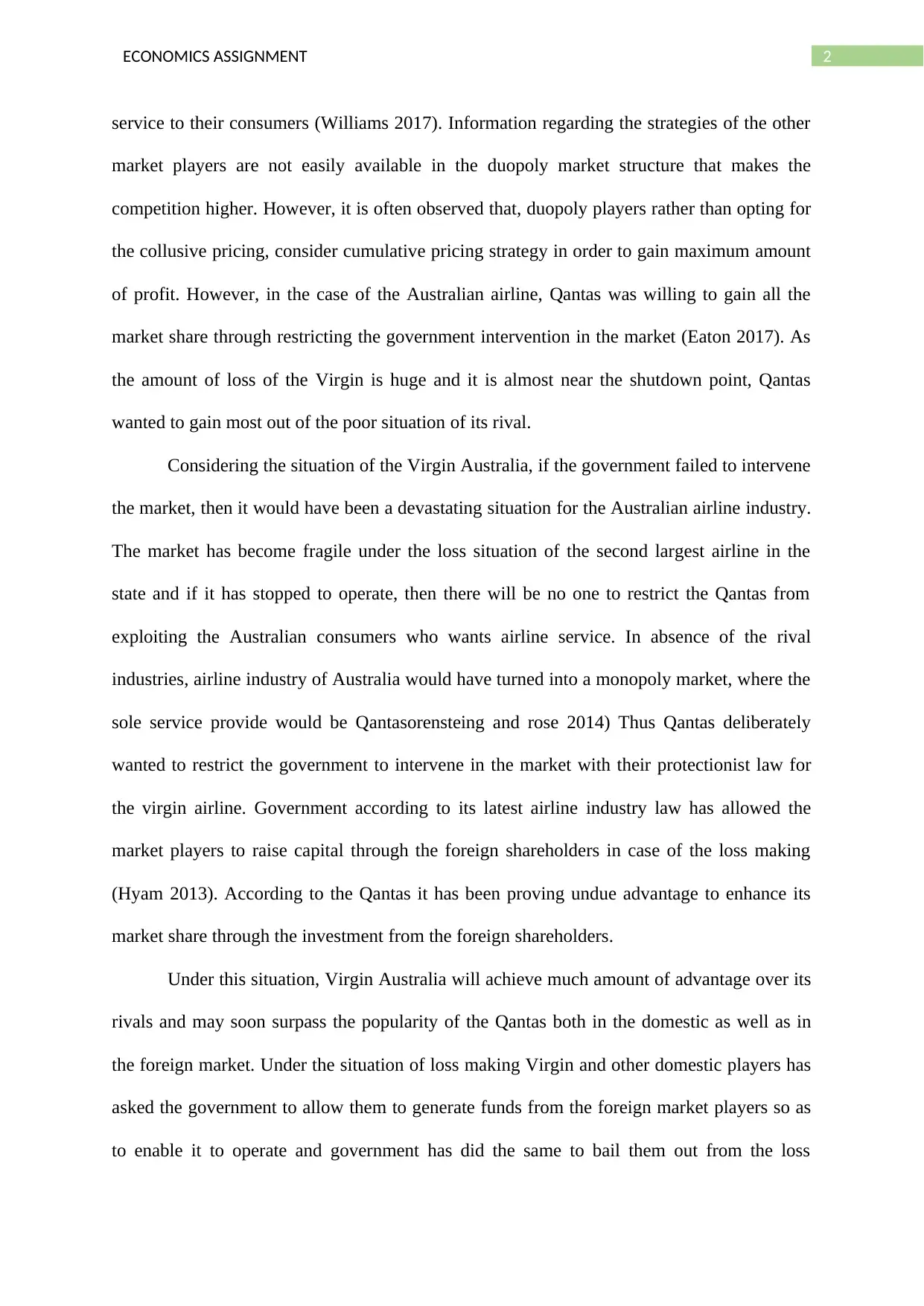
2ECONOMICS ASSIGNMENT
service to their consumers (Williams 2017). Information regarding the strategies of the other
market players are not easily available in the duopoly market structure that makes the
competition higher. However, it is often observed that, duopoly players rather than opting for
the collusive pricing, consider cumulative pricing strategy in order to gain maximum amount
of profit. However, in the case of the Australian airline, Qantas was willing to gain all the
market share through restricting the government intervention in the market (Eaton 2017). As
the amount of loss of the Virgin is huge and it is almost near the shutdown point, Qantas
wanted to gain most out of the poor situation of its rival.
Considering the situation of the Virgin Australia, if the government failed to intervene
the market, then it would have been a devastating situation for the Australian airline industry.
The market has become fragile under the loss situation of the second largest airline in the
state and if it has stopped to operate, then there will be no one to restrict the Qantas from
exploiting the Australian consumers who wants airline service. In absence of the rival
industries, airline industry of Australia would have turned into a monopoly market, where the
sole service provide would be Qantasorensteing and rose 2014) Thus Qantas deliberately
wanted to restrict the government to intervene in the market with their protectionist law for
the virgin airline. Government according to its latest airline industry law has allowed the
market players to raise capital through the foreign shareholders in case of the loss making
(Hyam 2013). According to the Qantas it has been proving undue advantage to enhance its
market share through the investment from the foreign shareholders.
Under this situation, Virgin Australia will achieve much amount of advantage over its
rivals and may soon surpass the popularity of the Qantas both in the domestic as well as in
the foreign market. Under the situation of loss making Virgin and other domestic players has
asked the government to allow them to generate funds from the foreign market players so as
to enable it to operate and government has did the same to bail them out from the loss
service to their consumers (Williams 2017). Information regarding the strategies of the other
market players are not easily available in the duopoly market structure that makes the
competition higher. However, it is often observed that, duopoly players rather than opting for
the collusive pricing, consider cumulative pricing strategy in order to gain maximum amount
of profit. However, in the case of the Australian airline, Qantas was willing to gain all the
market share through restricting the government intervention in the market (Eaton 2017). As
the amount of loss of the Virgin is huge and it is almost near the shutdown point, Qantas
wanted to gain most out of the poor situation of its rival.
Considering the situation of the Virgin Australia, if the government failed to intervene
the market, then it would have been a devastating situation for the Australian airline industry.
The market has become fragile under the loss situation of the second largest airline in the
state and if it has stopped to operate, then there will be no one to restrict the Qantas from
exploiting the Australian consumers who wants airline service. In absence of the rival
industries, airline industry of Australia would have turned into a monopoly market, where the
sole service provide would be Qantasorensteing and rose 2014) Thus Qantas deliberately
wanted to restrict the government to intervene in the market with their protectionist law for
the virgin airline. Government according to its latest airline industry law has allowed the
market players to raise capital through the foreign shareholders in case of the loss making
(Hyam 2013). According to the Qantas it has been proving undue advantage to enhance its
market share through the investment from the foreign shareholders.
Under this situation, Virgin Australia will achieve much amount of advantage over its
rivals and may soon surpass the popularity of the Qantas both in the domestic as well as in
the foreign market. Under the situation of loss making Virgin and other domestic players has
asked the government to allow them to generate funds from the foreign market players so as
to enable it to operate and government has did the same to bail them out from the loss
⊘ This is a preview!⊘
Do you want full access?
Subscribe today to unlock all pages.

Trusted by 1+ million students worldwide
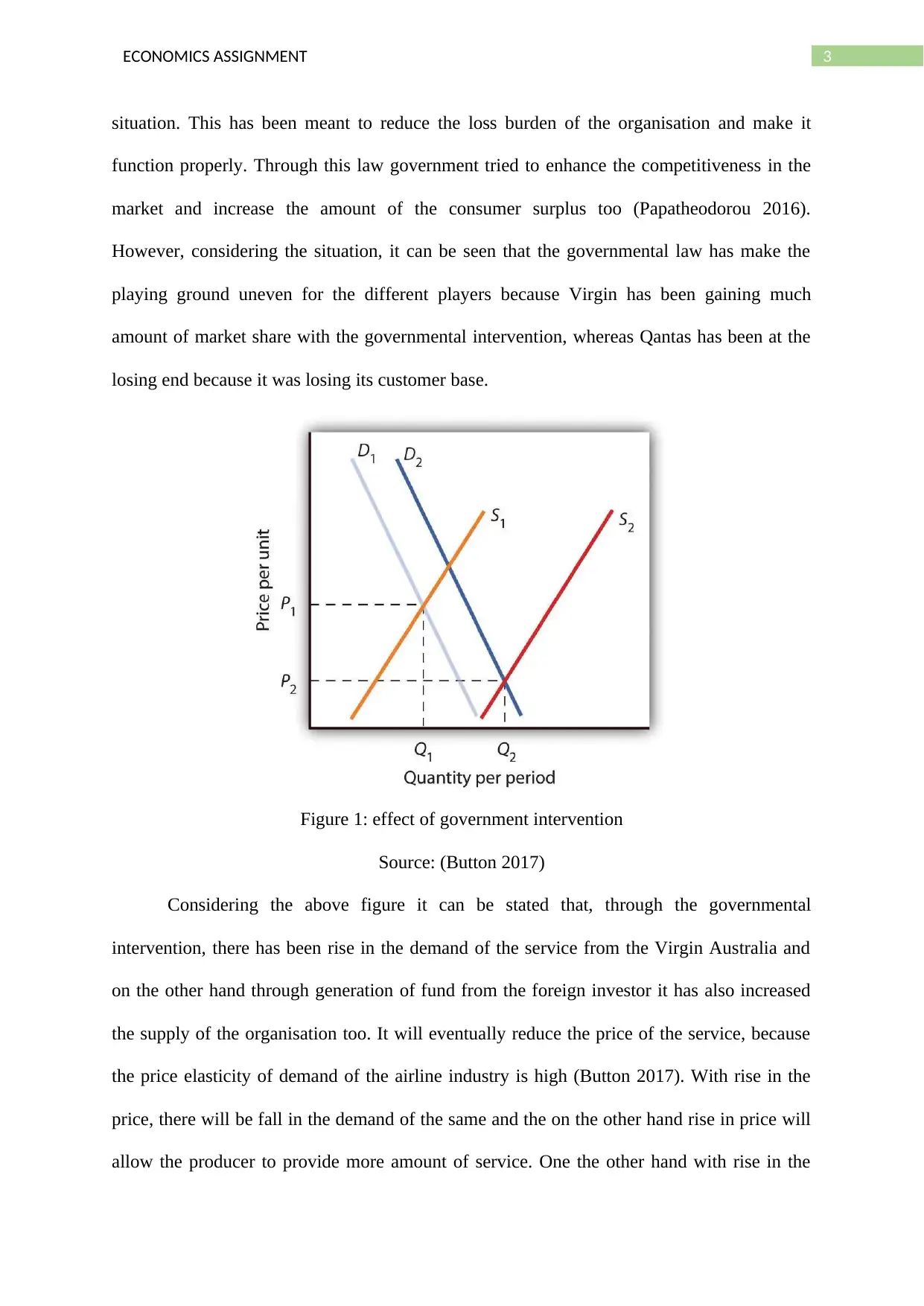
3ECONOMICS ASSIGNMENT
situation. This has been meant to reduce the loss burden of the organisation and make it
function properly. Through this law government tried to enhance the competitiveness in the
market and increase the amount of the consumer surplus too (Papatheodorou 2016).
However, considering the situation, it can be seen that the governmental law has make the
playing ground uneven for the different players because Virgin has been gaining much
amount of market share with the governmental intervention, whereas Qantas has been at the
losing end because it was losing its customer base.
Figure 1: effect of government intervention
Source: (Button 2017)
Considering the above figure it can be stated that, through the governmental
intervention, there has been rise in the demand of the service from the Virgin Australia and
on the other hand through generation of fund from the foreign investor it has also increased
the supply of the organisation too. It will eventually reduce the price of the service, because
the price elasticity of demand of the airline industry is high (Button 2017). With rise in the
price, there will be fall in the demand of the same and the on the other hand rise in price will
allow the producer to provide more amount of service. One the other hand with rise in the
situation. This has been meant to reduce the loss burden of the organisation and make it
function properly. Through this law government tried to enhance the competitiveness in the
market and increase the amount of the consumer surplus too (Papatheodorou 2016).
However, considering the situation, it can be seen that the governmental law has make the
playing ground uneven for the different players because Virgin has been gaining much
amount of market share with the governmental intervention, whereas Qantas has been at the
losing end because it was losing its customer base.
Figure 1: effect of government intervention
Source: (Button 2017)
Considering the above figure it can be stated that, through the governmental
intervention, there has been rise in the demand of the service from the Virgin Australia and
on the other hand through generation of fund from the foreign investor it has also increased
the supply of the organisation too. It will eventually reduce the price of the service, because
the price elasticity of demand of the airline industry is high (Button 2017). With rise in the
price, there will be fall in the demand of the same and the on the other hand rise in price will
allow the producer to provide more amount of service. One the other hand with rise in the
Paraphrase This Document
Need a fresh take? Get an instant paraphrase of this document with our AI Paraphraser
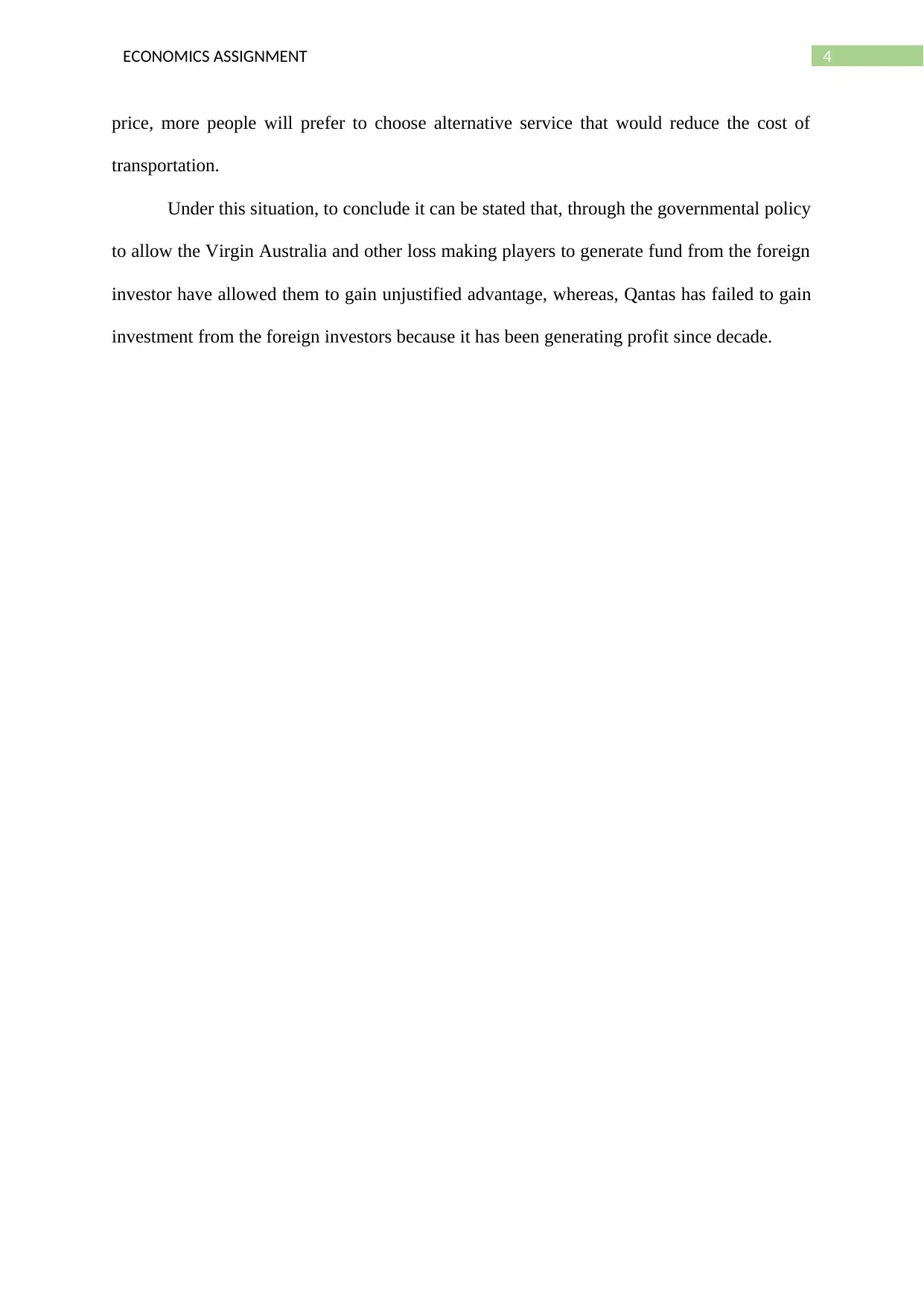
4ECONOMICS ASSIGNMENT
price, more people will prefer to choose alternative service that would reduce the cost of
transportation.
Under this situation, to conclude it can be stated that, through the governmental policy
to allow the Virgin Australia and other loss making players to generate fund from the foreign
investor have allowed them to gain unjustified advantage, whereas, Qantas has failed to gain
investment from the foreign investors because it has been generating profit since decade.
price, more people will prefer to choose alternative service that would reduce the cost of
transportation.
Under this situation, to conclude it can be stated that, through the governmental policy
to allow the Virgin Australia and other loss making players to generate fund from the foreign
investor have allowed them to gain unjustified advantage, whereas, Qantas has failed to gain
investment from the foreign investors because it has been generating profit since decade.
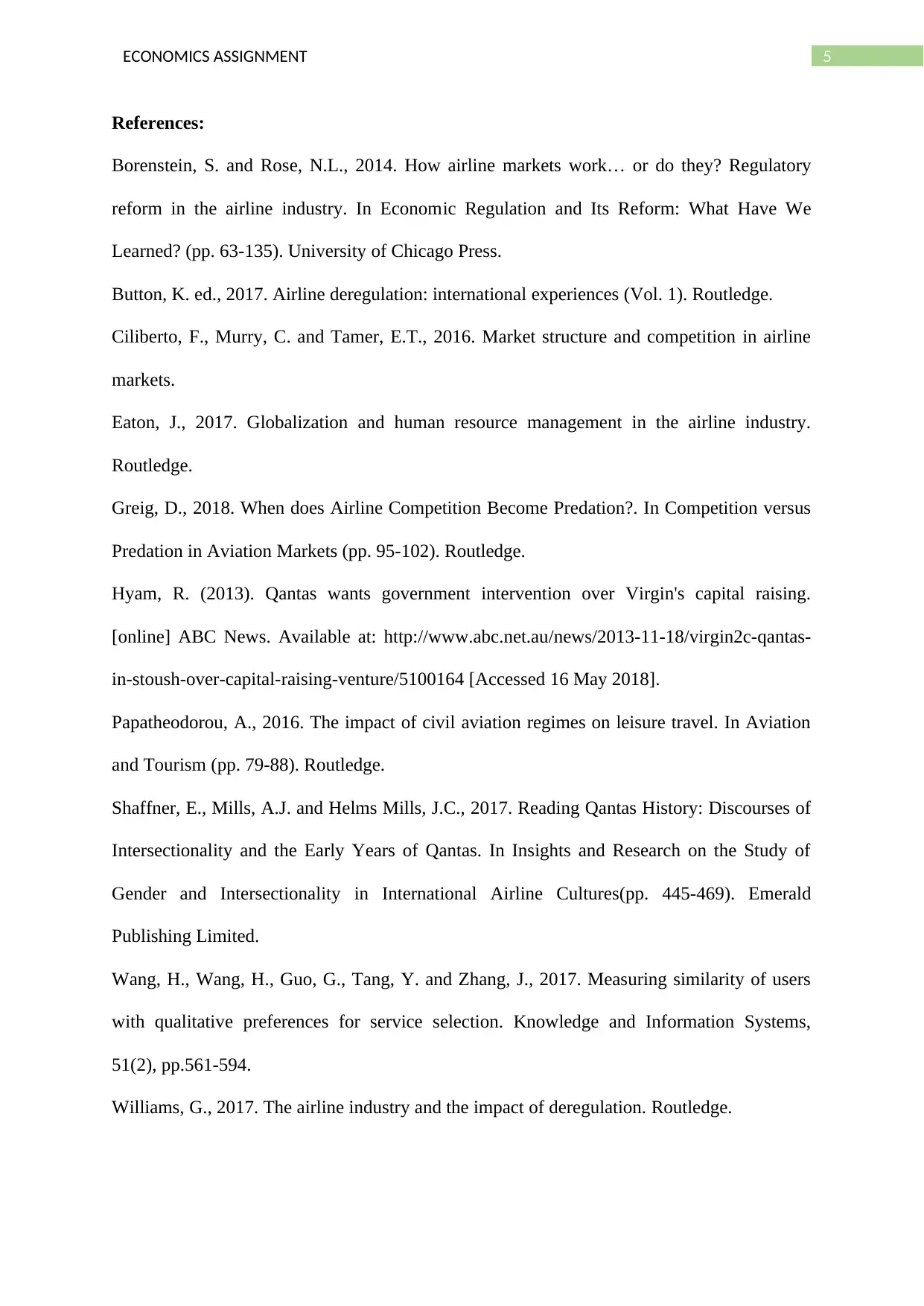
5ECONOMICS ASSIGNMENT
References:
Borenstein, S. and Rose, N.L., 2014. How airline markets work… or do they? Regulatory
reform in the airline industry. In Economic Regulation and Its Reform: What Have We
Learned? (pp. 63-135). University of Chicago Press.
Button, K. ed., 2017. Airline deregulation: international experiences (Vol. 1). Routledge.
Ciliberto, F., Murry, C. and Tamer, E.T., 2016. Market structure and competition in airline
markets.
Eaton, J., 2017. Globalization and human resource management in the airline industry.
Routledge.
Greig, D., 2018. When does Airline Competition Become Predation?. In Competition versus
Predation in Aviation Markets (pp. 95-102). Routledge.
Hyam, R. (2013). Qantas wants government intervention over Virgin's capital raising.
[online] ABC News. Available at: http://www.abc.net.au/news/2013-11-18/virgin2c-qantas-
in-stoush-over-capital-raising-venture/5100164 [Accessed 16 May 2018].
Papatheodorou, A., 2016. The impact of civil aviation regimes on leisure travel. In Aviation
and Tourism (pp. 79-88). Routledge.
Shaffner, E., Mills, A.J. and Helms Mills, J.C., 2017. Reading Qantas History: Discourses of
Intersectionality and the Early Years of Qantas. In Insights and Research on the Study of
Gender and Intersectionality in International Airline Cultures(pp. 445-469). Emerald
Publishing Limited.
Wang, H., Wang, H., Guo, G., Tang, Y. and Zhang, J., 2017. Measuring similarity of users
with qualitative preferences for service selection. Knowledge and Information Systems,
51(2), pp.561-594.
Williams, G., 2017. The airline industry and the impact of deregulation. Routledge.
References:
Borenstein, S. and Rose, N.L., 2014. How airline markets work… or do they? Regulatory
reform in the airline industry. In Economic Regulation and Its Reform: What Have We
Learned? (pp. 63-135). University of Chicago Press.
Button, K. ed., 2017. Airline deregulation: international experiences (Vol. 1). Routledge.
Ciliberto, F., Murry, C. and Tamer, E.T., 2016. Market structure and competition in airline
markets.
Eaton, J., 2017. Globalization and human resource management in the airline industry.
Routledge.
Greig, D., 2018. When does Airline Competition Become Predation?. In Competition versus
Predation in Aviation Markets (pp. 95-102). Routledge.
Hyam, R. (2013). Qantas wants government intervention over Virgin's capital raising.
[online] ABC News. Available at: http://www.abc.net.au/news/2013-11-18/virgin2c-qantas-
in-stoush-over-capital-raising-venture/5100164 [Accessed 16 May 2018].
Papatheodorou, A., 2016. The impact of civil aviation regimes on leisure travel. In Aviation
and Tourism (pp. 79-88). Routledge.
Shaffner, E., Mills, A.J. and Helms Mills, J.C., 2017. Reading Qantas History: Discourses of
Intersectionality and the Early Years of Qantas. In Insights and Research on the Study of
Gender and Intersectionality in International Airline Cultures(pp. 445-469). Emerald
Publishing Limited.
Wang, H., Wang, H., Guo, G., Tang, Y. and Zhang, J., 2017. Measuring similarity of users
with qualitative preferences for service selection. Knowledge and Information Systems,
51(2), pp.561-594.
Williams, G., 2017. The airline industry and the impact of deregulation. Routledge.
⊘ This is a preview!⊘
Do you want full access?
Subscribe today to unlock all pages.

Trusted by 1+ million students worldwide
1 out of 6
Related Documents
Your All-in-One AI-Powered Toolkit for Academic Success.
+13062052269
info@desklib.com
Available 24*7 on WhatsApp / Email
![[object Object]](/_next/static/media/star-bottom.7253800d.svg)
Unlock your academic potential
Copyright © 2020–2025 A2Z Services. All Rights Reserved. Developed and managed by ZUCOL.





